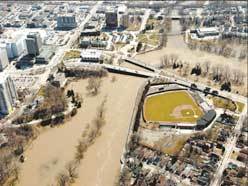City schools among potential flood targets
CLIMATE CHANGE FALLOUT: A public meeting Wednesday at city hall will probe the threat to pollution control plants, dikes and local schools
Last Updated: November 2, 2011 9:27am
- Email Story
- Size A A A
- Report Typo

- High water inundates low-lying areas near the forks of the Thames River in London in 2008. West London dike, opposite Harris Park, could be overtopped by "climate change-caused flooding," a report says. (Free Press file photo)
Pollution control plants, dikes and four schools face flooding risks as climate change alters storm patterns, threatening to overwhelm London infrastructure, says an expert report now going to the public.
With city staff years into an at times controversial study of possible climate change effects on London, residents can weigh in at an open session Wednesday night.
“Climate change information is telling us that some of our standards need to be updated,” said Pat McNally, London’s executive director of planning, environment and engineering services. “Infrastructure that we previously deemed as relatively safe, is it now more at risk?”
Specific concerns over increasing frequency of intense storms came in a report this year by Slobodan Simonovic of the University of Western Ontario’s Institute for Catastrophic Loss Reduction.
The report cites several areas of concern, and offers recommendations including:
- Flood scenarios could affect four schools: Prince Charles, Princess Anne French Immersion, St. Pius X and Jeanne Sauve French Immersion, all of which need “very detailed protocol and procedure” in case of flooding.
- West London and Broughdale dikes could be “overtopped” by “climate change-caused flooding,” and emergency plans are needed for areas behind both.
- Four pollution control plants — Greenway, Adelaide, Vauxhall and Pottersburg — should “raise or make mobile” essential operation equipment, given the crippling flood risks facing each.
- The city must probe the effects of other “climate change factors” beyond flooding, such as temperature extremes and shifts in freeze/thaw cycles.
The recommendations also call for further study on climate change implications on London.
But work so far — one estimate puts the price-tag at about $250,000 — has encountered political resistance, with some councillors questioning the value of studying environmental changes at a local level.
The city’s development industry has also raised questions, prompted in part by the cost hikes they’d face if standards change, such as requiring larger storm-water management ponds.
But doing nothing, McNally argues, could be even costlier.
“Talk to the Insurance Bureau of Canada and ask them where storm-related claims sit relative to fire. They’ll tell you (flooding) claims are hugely increasing.
“We’re not going to fix things overnight. We’re trying to set a good path to deal with it in a responsible fashion.”
The public is invited to offer feedback on the ongoing study Wednesday from 6:30 p.m. to 8:30 p.m. in council chambers at city hall.
E-mail patrick.maloney@sunmedia.ca, read Patrick's City Hall blog or follow PatatLFPress on Twitter.
- Email Story
- Size A A A
- Report Typo
As Advertised in The London Free Press
- Events
- Retail
- Food & Entertainment
- Automotive
- Homes
- Health
- Travel
- Miscellaneous
- View All Advertisers
Your Scoop
.jpg)
Share your story with the London Free Press!
Send us your photos, video or a quick note about something you've seen on the streets of London.
Popular on canoe.ca
- 1.Lohan's jail time to be short
- 2.Seyfried may do porn biopic
- 3.Kardashian: Divorce was intuition
- 4.Three dead in northern Ontario helicopter crash
- 5.Ontario senior hit with $57,000 gas bill
- 6.Nickelback tops turn-off list
- 7.Lupul does the trick for Leafs
- 8.Lingerie store workers' bra sizes on display
- 9.CBS 'nipplegate' fine tossed
- 10.Two Ontario cops facing charges resign
 8°
8° 9°/-1°
9°/-1°.jpg)
.jpg)
.jpg)
.jpg)
.jpg)
.jpg)
.jpg)
.jpg)



.jpg)
.jpg)
.jpg)
.jpg)
.jpg)
.jpg)
Your Comments